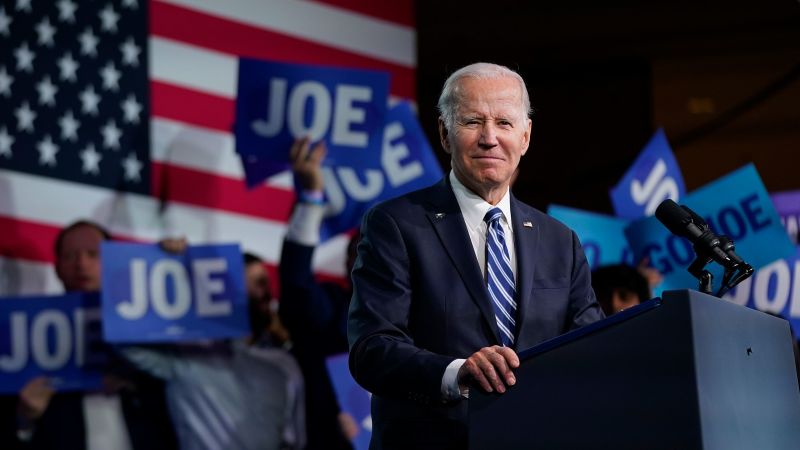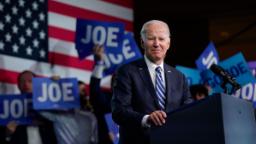

CNN
—
President Joe Biden’s yearly State of the Union speech – his first in front of a divided Congress – will offer the best glimpse to date of his argument for another term, making Tuesday’s address a test run of sorts as he approaches a reelection announcement.
In both substance and delivery, Biden hopes to present a vigorous and optimistic portrait to the American people of his first two years in office, reminding them of his accomplishments while also demonstrating to his largest television audience of the year that he has the ability to keep serving the country until he is 86 years old.
He is certain to tick through efforts to curb inflation, improve the nation’s infrastructure and steer the country through the Covid-19 pandemic. And he’s planning to address this weekend’s shoot-down of a suspected Chinese spy balloon, part of a larger section about outcompeting Beijing that aides have been editing and refining in the days before the speech.
The speech is the culmination of a writing process under way since late last year, subject to constant edits, tweaks and additions to reflect the real-time nature of the job and issues that have captured the nation’s attention.
That includes a fresh push for urgency on long-stalled police reform after the visceral nature of videos depicting the beating death in Memphis of Tyre Nichols at the hands of police. A two-hour-long Oval Office meeting with key members of the Congressional Black Caucus last week helped shape Biden’s views and led to a new round of edits.
So, too, has the push for an assault weapons ban been made more pressing after countless mass shootings in recent months. And new evidence of an economy that continues to defy critics and economists alike has helped shape Biden’s economic message.
Yet at its core, the broad pillars of Biden’s annual address will remain as they were sketched out by top advisers Mike Donilon and Bruce Reed, with speechwriter Vinay Reddy, in the early days of January, officials told CNN.
Biden believes the accomplishments he will present Tuesday are durable and wide-ranging – and that his message on the economy and the US’ role in the world is as resonant as it is animating for his presidency.
“I want to talk to the American people and let them know the state of affairs,” Biden said Monday after he returned from two days spent holed up at Camp David with his top advisers working through his remarks. “What’s going on, what I’m looking forward to working on from this point on, what we’ve done. Just having a conversation with the American people.”
The prime time address will give Biden a springboard into the coming weeks, which will include travel to critical electoral states to tout his accomplishments and, advisers acknowledge, a reelection announcement that is all but certain at this point.
One adviser, asked what to expect in the remarks, pointed to a series of Biden speeches in the last several weeks as a roadmap to his nationwide address. “There isn’t some ‘new’ Joe Biden,” the adviser said. “He is who is, and his consistency is nothing if not consistent.”
Or, as White House press secretary Karine Jean-Pierre put it in a statement that was, on its face, both obvious and intentional: “The speech is going to sound like a Joe Biden State of the Union speech.”
If there’s any difference between this State of the Union address and the address he delivered last year, the adviser added, “it’s that now we have two years of evidence to back up those convictions.”
Beneath the optimism, however, is a lingering sense of American gloom that Biden hasn’t been able to shake. And despite his calls for unity, the simple optics of the speech will make plain the challenges lying ahead.
Sitting behind him for the first time will be Republican House Speaker Kevin McCarthy, who has vowed to resist most of Biden’s ambitions. He leads a fractious GOP conference whose members have shown little willingness to help Biden pass new laws.
During his speech, Biden will call on Congress to pass or make permanent a number of items that could help Americans economically: Expanding a child tax credit, closing a loophole preventing some families from accessing affordable health care, extending a price cap on insulin and passing a law to ban certain “junk fees” on consumers.
He’ll also renew calls for Congress to pass a minimum tax on billionaires and propose a new rule requiring construction materials – including cables, lumber and drywall – be made in America when used on projects receiving federal assistance.
And he’ll tout progress and upcoming efforts toward his “unity agenda,” the bipartisan plan he put forth on ending cancer, supporting veterans, tackling the mental health crisis and combating the opioid epidemic.
“We have seen that we can deliver on these priorities. … What you’ll hear about him talking about in tonight’s State of the Union is a desire to keep moving forward on that work,” White House communications director Kate Bedingfield said.
Yet without cooperation from the new Republican majority, it remains unlikely that major pieces of legislation will cross Biden’s desk anytime soon.
There are some who view the House GOP as a useful foil for Biden as he prepares to battle for the presidency against a to-be-determined Republican opponent. In a string of speeches over the past week, he has cast them as obstructionists who are willing to throw the country into economic tailspin.
He will reiterate his position Tuesday, telling Republicans he won’t negotiate on raising the debt limit. But he will voice openness to separate discussions on reducing the deficit.
But there has been an internal debate among Biden’s advisers over just how harshly the president should chastise Republicans in his State of the Union speech. He is a president who promised unity and holds out hope for working with Republicans even in a contentious election year.
The reality is many Americans still aren’t feeling the accomplishments that Biden is trying to sell, at least according to polls. An ABC News/Washington Post survey this weekend showed a majority of Americans – 62% – say they do not believe Biden has achieved much during his first two years in office.
“It’s understandable that even as personal household circumstances, for the majority of people, have improved, the anxiety – the economic anxiety – is real,” said Biden’s top economic adviser Brian Deese a day ahead of the speech. “The president will both speak directly to the fact that we have more work to do but also underscore how the progress we have made to date can paint a picture to move forward.”
Deese said Biden would “meet the American people where they are” when it comes to persistent economic anxieties, fueled in part by the global pandemic and Russia’s invasion of Ukraine.
Biden and his advisers have been acutely aware that crowing too much about actions most Americans don’t yet feel could have an adverse effect. As he approaches an announcement on running for reelection, however, that record will nonetheless comprise the heart of his argument.
Polls show many Democrats are unenthusiastic about another Biden candidacy. The ABC News/Washington Post survey indicated 58% of Democrats and Democratic-leaning independents would prefer someone other than Biden as the nominee in 2024.
“If I were still a practicing political strategist and had the president’s record, I think you could easily reelect him. But the question has never been political. It’s actuarial,” said David Axelrod, the former senior adviser to President Barack Obama and a CNN senior political commentator. “This isn’t about his performance. It really is about age.”
For many in Biden’s television audience, Tuesday’s speech will be one of the only times they actually hear and see the president this year. While State of the Union speeches have steadily drawn smaller numbers over the years, it remains a president’s largest single platform.
For someone who is preparing to ask voters to keep him in office until he is 86, it will be critical to look and sound like someone who is able to keep doing the job.
At Camp David for most of this weekend with his senior team – including the main architect of the speech, Reed, messaging gurus Donilon and Anita Dunn, longtime aide Steve Ricchetti, Reddy and historian Jon Meacham – Biden ran through drafts and practiced its delivery, ensuring the language lends itself to a vigorous presentation.
He arrived at the presidential retreat just after a US F-22 fighter jet fired a missile into the suspected Chinese spy balloon, sending its payload tumbling into the Atlantic Ocean.
Biden instructed his military leaders Wednesday to shoot down the balloon, but only when its falling debris wasn’t at risk of harming lives or property.
China was included in the text of Biden’s speech well before the balloon slipped into American airspace last week. But the incursion, which has generated a diplomatic backlash from China and drawn second-guessing from Republicans, lends new urgency to Biden’s message about competing with Beijing.
Biden and his aides believe steps to counter China are one of the rare areas where he could find bipartisan support. He saw some success on that front with the passage of a law boosting US semiconductor production last year.
Still, the response from Republicans to Biden’s decision to wait to shoot down the balloon proved illustrative and reaffirmed China as a volatile political topic. Biden is sensitive to accusations he is weak on China, according to people around him, while still intent on stabilizing the world’s most important bilateral relationship.
He and his team refined and edited the China language in the State of the Union address over the weekend. The president tweeted a photo of one of his drafts, which he ran through fueled by two chocolate chip cookies.
Originally scheduled to arrive back to the White House midday, Biden spent most of the afternoon Monday at Camp David continuing his preparation.
